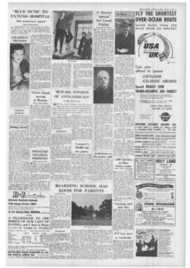Page 2, 15th March 1963
Page 2

Report an error
Noticed an error on this page?If you've noticed an error in this article please click here to report it.
Tags
Share
Related articles
Why No Consultation?
New Look For Church?
My Survey Answers May Madden Some Readers
Equal Shares In The Church Pie
Trifles That Stood
A NEW LOOK
Mr. Lyle (March 8) may be partly right in attributing the slow progress of the liturgical movement in this country to apathy, conservatism and smugness on the part of the laity, but if so, how does he account for the fact that in some parishes the laity do in fact play a very much more active part in the Mass and in the parish life in general than in others ?
It is not enough for a priest merely to invite the congregation to join in the responses of the Mass. even if they have leaders to help them to do so. They must first be convinced as to why it is desirable that they should join in, and this involves a minimum of training in the community aspect of the Mass.
I believe that if the true role of the laity were sufficiently impressed upon them and they were given active encouragement to fulfil it in such ways as Mr. Adamthwaite suggested in his article, we should not lag so far behind our continental neighbours in this way.
It is noticeable the difference that can take place in a parish in the space of a few months after the appointment of a zealous parish priest who is determined to associate the laity as closely as possible with his work. He will certainly meet with resistance at first from a certain section of the congregation, but with perseverance and tact it will not be long before the "new look" has caught on and the parish will cease to be a mere collection of individuals each indulging in his own particular brand of piety, and begin to resemble the large family. closely knit together by the ties of charity, that Christ our Lord intended it to be.
(Miss) P. D. Smith
London, S.W.I.
Without appearing to enter into a medieval disputation with Mr. Lyle I would like to take up some points from his letter.
1. What are the 'apostolic organizations' which the laity are not joining? Dose he mean Confraternities, the S.V.P., the K.S.C. and so on, or does he mean, for example, parish councils which the clergy would allow to play a really active part in parish life? In my experience, many of these 'apostolic organizations' are not allowed to function freely but are mere cyphers.
2. In addition, the clergy cannot really blame the laity for 'letting them down' if the laity have not been educated in the true spirit of their place within the Church. For so many years the laity have grown used to being led and to being inactive one can hardly expect them to change overnight.
1 I resist the temptation to name some dioceses where there is an almost active opposition to dialogue Mass on the part, it would seem, of the highest authority.
More importantly, the laity will never clamour for dialogue Mass and their rightful participation in the liturgy until they have been 'educated' in the liturgy and shown the true nature of the Mass. Once again, you cannot have a sweeping change of opinion overnight. The Mass is still rarely preached and many Catholics, unfortunately. still feel genuinely that they should leave the Mass to the priest while they get on with private devotions. As an example of this one might quote Evelyn Waugh's recent article in "The Spectator". It is for the clergy and especially for teachers in Catholic schools to prepare the laity for participation.
4. 'Progressive Catholics' (and apologise for the phrase) want to work with the clergy and in many cases are doing so. Not infrequently, however, they meet obstruction and frustration.
5. If we could help the clergy by removing from them the need to become experts in football pools and bingo they would be left free to visit us. I am sure they would welcome the opportunity to rediscover a true pastoral vocation.
What is needed above all is the establishment of a true 'dialogue' between clergy and laity.
'Lecturer' Manchester.
blog comments powered by Disqus













